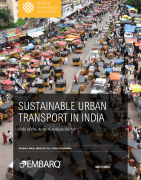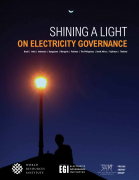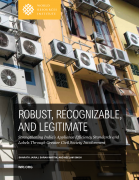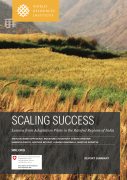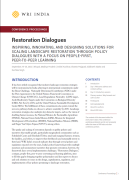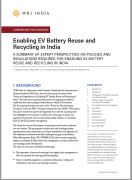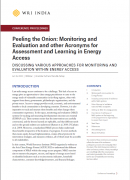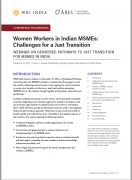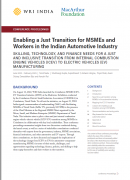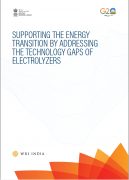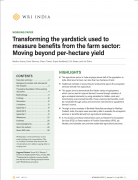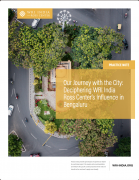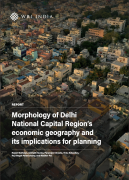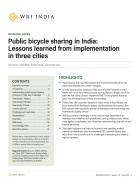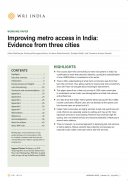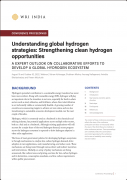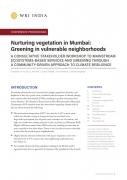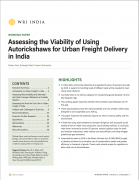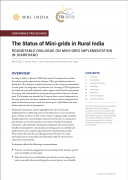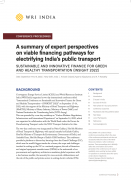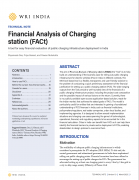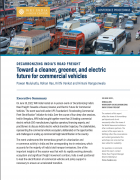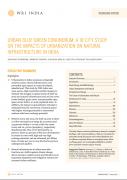Publications
WRI is committed to producing high-quality research, including reports, working papers, issue briefs, and fact sheets. Our publications are subject to peer review, and are held to traditional "academic" standards of excellence, such as objectivity and rigor.
All of our publications are available to download. You may obtain hard copies of select WRI reports at no charge (except shipping and handling) through our print publications catalog.
Subscribe to get notified of new publications or get the RSS feed.
-
Restoration Dialogues: Inspiring, Innovating, and Designing Solutions for Scaling Landscape Restoration Through Policy Dialogues With a Focus on People-First, Peer-to-Peer Learning
by , , e -This conference proceedings presents findings derived from global, national, and regional best practices and solutions on scaling landscape restoration initiatives in Madhya Pradesh. The document summarizes the discussions held in Bhopal, Madhya Pradesh on September 19‒20, 2022 that aimed at...
-
Enabling EV Battery Reuse and Recycling in India
by , e -This conference proceedings examines the policies and regulations needed to enable the reuse and recycling of retired electric vehicle (EV) batteries in India. The document summarizes the proceedings of a focused group discussion hosted by WRI India in collaboration with Deutsche Gesellschaft...
-
Peeling the Onion: Monitoring and Evaluation and other Acronyms for Assessment and Learning in Energy Access
by e -The proceeding summarizes insights from a webinar at the Asia Clean Energy Forum (ACEF) 2022 organized by the World Resources Institute to understand the different components of Monitoring and Evaluation (M&E) within the energy access program. It discusses recommendations and experiences of...
-
Women Workers in Indian MSMEs: Challenges for a Just Transition
by , , e -The proceedings summarize key takeaways from a webinar on “Gendered Pathways to Just Transition for MSMEs in India” hosted in December 2022 by WRI India.
The webinar brought together policymakers, academia, researchers, trade union and practitioners to understand the present challenges...
-
Enabling a Just Transition for MSMEs and Workers in the Indian Automotive Industry
by , , , , , e -The proceedings summarize insights from two discussions conducted during the launch of the Coimbatore MSME ICEV-EV Transition Initiative (MITI) in August 2022, at the Elektrotec Exhibition conducted by the Coimbatore District Small Industries Association (CODISSIA), in association with WRI India...
-
Accelerating the Production and Use of Green Hydrogen
by , , e -This report focuses on three key aspects that G20 nations should prioritize to establish and accelerate the adoption of green hydrogen. The primary focus areas identified in this report include:
- International supply chains for green hydrogen including production, transport and ...
-
Supporting the Energy Transition by Addressing Technology Gaps of Electrolyzers
by , , , e -Supporting the energy transition by addressing technology gaps of electrolyzers- This report reviews the progress and current state of play for hydrogen production and corresponding electrolyzer technologies and proposes recommendations for addressing technology challenges, and exploring...
-
Transforming the Yardstick Used to Measure Benefits From the Farm Sector
by , , , , e -Traditional systems of accounting for agricultural productivity focus solely on yield-based contributions and totally ignore the biodiversity and ecosystem services derived from agriculture. The study uses a framework and approaches developed under ‘The Economics of Ecosystems and Biodiversity (...
-
Our Journey with the City: Deciphering WRI India Ross Center’s Influence in Bengaluru
by , , e -WRI India Ross Center for Sustainable Cities (previously EMBARQ India) has maintained a presence in Bengaluru since 2010. It has served as a key change agent for sustainable development, starting with mobility and moving more broadly to urban development, related services such as energy and...
-
Morphology of Delhi National Capital Region’s Economic Geography and its Implications for Planning
by , , , , e -There is now global evidence that it is cities and their immediate regions that drive economic growth. This report studies the Delhi National Capital Region (NCR), which accommodates India’s foremost economic agglomeration, through an economic geography lens that closely synergizes with urban...
-
Public Bicycle Sharing in India
by , , e -This working paper examines the growth and challenges of public bicycle-sharing (PBS) systems in India, within the context of global efforts towards low-carbon transport. While many Indian cities initially adopted rental-based PBS systems with limited bicycle availability, Mysuru, Bhopal, and...
-
Improving Metro Access in India
by , , , e -Poor access (last-mile connectivity) to metro rail systems in India has contributed to lower-than-planned ridership, causing the underutilization of over US$25 billion in investments in the sector. There is little understanding of what metro commuters seek from their last-mile commute. This...
-
Understanding Global Hydrogen Strategies
by , , , e -WRI India’s webinar series on "Understanding Global Hydrogen Strategies" aim to facilitate an understanding of the various approaches taken by countries to develop a robust clean hydrogen ecosystem. The two-part webinar series held on August 10, 2022, and October 20, 2022, featured the...
-
Nurturing Vegetation in Mumbai: Greening in Vulnerable Neighborhoods
by , e -The proceedings summarize the reflections of stakeholders from a 2-day workshop hosted in December 2022 by the Brihanmumbai Municipal Corporation (BMC), organized by WRI India in partnership with the Tata Institute of Social Sciences (TISS) and Youth for Unity and Voluntary Action (YUVA)....
-
Assessing the Viability of Using Autorickshaws for Urban Freight Delivery in India
by , e -It is estimated that, between 2020 and 2030, India’s freight activity will increase fivefold (NITI Aayog et al. 2021). To meet the rising demand cost-effectively, we need to explore new forms of micro-mobility-based, last-mile freight modes with a focus on low-emissions cargo transportation and...
-
The Status of Mini-grids in Rural India
by e -The proceedings summarize the reflections of stakeholders from a round-table dialogue on mini-grid implementation, that was organized by WRI India and Transform Rural India Foundation (TRIF), in Jharkhand in May 2022.
The dialogue included discussions on the economic sustainability of...
-
Viable Financing Pathways for Electrifying India’s Public Transport
by , e -The publication reflects the recommendations shared by stakeholders during INSIGHT 2022 – a two-day international conference organized by Convergence Energy Service Limited (CESL) and WRI India on September 15–16, 2022.
It also highlights the views of experts from a workshop on carbon...
-
Financial Analysis of Charging station (FACt)
by , e -The MS-Excel-based tool ‘Financial Analysis of Charging station (FACt)’ (the “Tool”) has been developed to help build an understanding of the business case for rolling out public charging infrastructure for electric vehicles (EVs) in the Indian context. It is a flexible, transparent, and user-...
-
Decarbonizing India’s Road Freight
by , , e -Urban freight transport is of crucial importance to the economic vitality of urban areas, providing both urban residents and businesses the necessary goods and services. Today, close to 71 percent of the freight transported in the country is completed on road. However, although it provides...
-
Urban Blue-Green Conundrum: A 10-city Study on the Impacts of Urbanization on Natural Infrastructure in India
by , , e -Urban development in all forms impacts the natural landscape, changing vegetation cover, infiltration rates and hydrological (surface and sub-surface) flows. With increasing urbanization urban areas lose a host of natural infrastructure and ecosystem services as ecosystems are modified, degraded...

